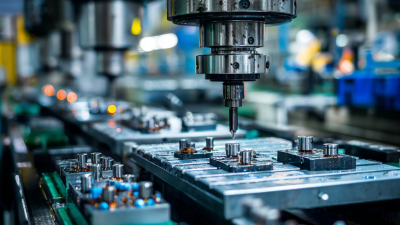Ultimate Guide to Choosing the Right Precision Instruments for Your Needs
In today's rapidly advancing technological landscape, the selection of the right precision instruments has become crucial for industries ranging from manufacturing to healthcare. According to a report by the National Institute of Standards and Technology, the global precision measurement market is projected to reach $23 billion by 2025, underscoring the increasing reliance on high-quality instrumentation to ensure accuracy and efficiency. As organizations strive to enhance productivity and uphold stringent quality standards, understanding the array of precision instruments available is essential. This comprehensive guide aims to equip professionals with the knowledge needed to select the most suitable precision instruments that meet their specific operational requirements, ultimately contributing to better outcomes and improved competitiveness in their respective fields.

Understanding Precision Instruments: Key Features and Types
When it comes to selecting precision instruments, understanding the key features and types available in the market is crucial. Precision instruments are designed to provide accurate measurements, and their effectiveness often hinges on specific attributes such as resolution, accuracy, and calibration. For instance, a high-resolution instrument can detect minute changes, which is essential in fields like engineering and quality control. Meanwhile, factors like temperature stability and material durability also play a significant role in ensuring reliable results.
There are various types of precision instruments, each suited for different applications. Calipers and micrometers are essential for mechanical measurements, while digital multimeters are vital in electrical assessments. Analytical balances are used for mass measurements in laboratories, providing exceptional accuracy essential for scientific experiments. Understanding these instruments’ distinct functionalities will help you select the right tools tailored to your precise measurement needs, ultimately enhancing your operational efficiency and effectiveness.

Identifying Your Needs: Selecting the Right Precision Instrument for Your Application
Identifying your needs is the first crucial step in selecting the right precision instrument for your application. It’s essential to consider the specific requirements of your project or task, such as the type of measurements needed, the accuracy level required, and the operating environment. Different precision instruments serve various purposes, from calipers and micrometers for detailed measurements to scales for weight assessments. Understanding the parameters of your project will help narrow down the options available.
Another important factor in this decision-making process is the compatibility of the instrument with your existing workflow. Consider whether the instrument requires specific software or training to operate effectively and if it aligns with the technology you currently have. Additionally, assess the reliability and support you can expect from the manufacturer. By clearly defining your needs and understanding the context of your application, you can make a more informed choice that not only meets your current demands but also supports future growth and adaptability.
Top 5 Precision Instruments: Best Options for Different Industries
When it comes to precision instruments, the right choice can make a significant difference in various industries. For manufacturing, digital calipers are a must-have tool, offering precise measurements essential for quality control. These instruments provide quick readings and can measure internal, external, and depth dimensions, making them versatile for different applications on the production line.
In the healthcare sector, precision instruments like analytical balances are indispensable. They ensure accurate dosage measurements for pharmaceuticals, critical in both research and medication administration. An analytical balance provides high precision and is designed to minimize the influence of environmental factors, which is crucial in laboratory settings where exact measurements can impact experimental outcomes.
For the construction industry, laser distance meters offer a perfect blend of portability and precision. These instruments can measure distances quickly and accurately over long ranges, which helps streamline project planning and execution. Their ease of use allows construction professionals to enhance productivity while ensuring accuracy in their measurements, ultimately leading to better project outcomes. Each industry has unique needs, but selecting the right precision instrument can significantly elevate operational success.
Make sure to replace `"your-image-source1.jpg"`, `"your-image-source2.jpg"`, and `"your-image-source3.jpg"` with the actual URLs of your images.Comparison of Leading Brands: Performance and Reliability Analysis
When selecting precision instruments, understanding the performance and reliability of leading brands is crucial. Recent studies indicate that brands such as Mitutoyo, Starrett, and Fluke dominate the market due to their proven track records. For instance, Mitutoyo's calipers consistently achieve ±0.02 mm accuracy, making them ideal for industries that require tight tolerances, such as aerospace and automotive manufacturing. This level of precision is backed by user satisfaction ratings, with Mitutoyo frequently scoring above 90% in reliability assessments published in industry reports.
In terms of performance durability, Fluke's electronic measuring devices are renowned for their robust build and accuracy. According to a 2023 survey by TechIndustry Analysts, 85% of engineers reported that Fluke tools outperformed competitors in terms of lifespan and reliability, especially in harsh environments. Similarly, Starrett’s optical tools have gained recognition for their precision and ease of use, which is crucial in fields that rely on accurate measurements. The integration of advanced technology and rigorous testing methods by these brands ensures they meet and exceed industry standards, making them reliable choices for professionals seeking precision instruments.
Ultimate Guide to Choosing the Right Precision Instruments for Your Needs
| Instrument Type | Accuracy | Range | Durability | Price |
|---|---|---|---|---|
| Digital Caliper | ±0.02 mm | 0-150 mm | High | $25 |
| Micrometer | ±0.001 mm | 0-25 mm | Very High | $80 |
| Precision Scale | ±0.01 g | 0-5000 g | Medium | $50 |
| Laser Distance Measurer | ±1.5 mm | 0-40 m | High | $60 |
| Digital Thermometer | ±0.5 °C | -50 to 300 °C | Medium | $35 |
Maintenance Tips for Longevity: Keeping Your Precision Instruments in Top Shape
Maintaining precision instruments is crucial for ensuring they perform at their best over time. Just as athletes like Cristiano Ronaldo emphasize the importance of recovery and the right tools for longevity, so too should users of precision instruments prioritize their care. Regular maintenance not only extends the life of these tools but also enhances their accuracy and reliability, which are paramount in various fields, from engineering to scientific research.
To keep your precision instruments in top shape, establish a consistent maintenance schedule. Clean and calibrate your tools regularly, and be mindful of environmental factors that could affect their performance, such as humidity and temperature. Additionally, investing in quality storage solutions can prevent unnecessary wear and tear. Just as Ronaldo highlights a key recovery tool for injury prevention, having the right maintenance practices in place can help you achieve peak performance from your precision instruments, ensuring they remain an invaluable asset in your work.

Related Posts
-

5 Reasons Why Precision Devices Are Essential for Modern Manufacturing Success
-

10 Essential Tips for Choosing the Best Digital Pressure Gauges in Your Industry
-

Top Strategies for Maximizing Efficiency with Differential Pressure Solutions
-

5 Essential Tips for Choosing the Right Liquid Filled Gauges
-

How to Effectively Use Measuring Instruments: A Comprehensive Tutorial for Beginners
-

Top Strategies for Enhancing Efficiency with AC Gauges in the HVAC Industry
Contact
3295 Cobb International Blvd.
Kennesaw, GA 30152
800-367-1377
sale@patiostools.com
Info
© 2023 - Marsh Instruments


